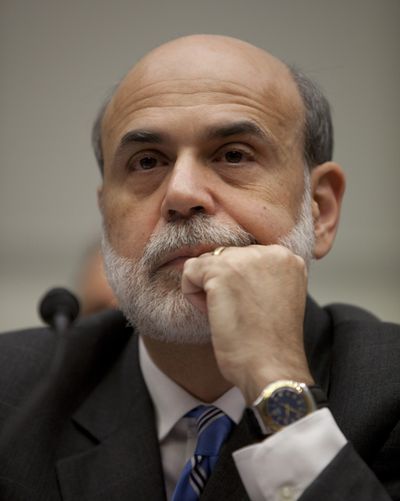Fed caught up in power play
Obama, Congress at odds over role

WASHINGTON – The Federal Reserve has dramatically expanded its role in the economy over the past 18 months, and the Obama administration has proposed enhancing that authority as part of an overhaul of financial regulations.
But many members of Congress – Democrats and Republicans – are seeking to curtail the central bank’s authority instead of expand it.
Worried about the increased power of the complex and mysterious Fed, and upset it did not do more to prevent the deep recession, the central bank has become the focus of anger on Capitol Hill over the financial crisis and its aftermath. The Fed finds itself at the center of a collision of traditional political concerns: conservative fears of heavy-handed government intervention in free markets and liberal complaints of regulators who favor corporate executives over average Americans.
More than two-thirds of the House of Representatives have signed on to a bill that would subject the central bank to increased congressional oversight through expanded audits. A key senator wants to strip the Fed of its authority to regulate banks. And the chairman of the House Financial Services Committee wants to rein in the Fed’s emergency lending power, which it used to help engineer the sale of Bear Stearns and bail out American International Group.
Federal Reserve Chairman Ben S. Bernanke defended the agency during a congressional hearing Thursday. He reiterated his belief that that the Fed is best-suited for taking on the major new role the Obama administration has proposed for it: supervising large financial institutions that pose a risk to the entire economy.
But Bernanke also acknowledged the criticism of the Fed’s actions during the financial crisis, saying he shared congressional frustration.
“There’s nobody more sick and tired of bailouts than me,” Bernanke said.
Still, he appears to be fighting an uphill battle for increased power as Congress works to finish the regulatory overhaul this year.
“There just aren’t a lot of cheerleaders here for expanding the authority of the Federal Reserve,” said Kirstin Brost, a spokeswoman for the Senate Banking Committee.
The Obama administration wants to add to the Fed’s portfolio by giving it the task of supervising large financial firms, such as investment banks, that currently fall outside government banking regulation. That increased power would be offset somewhat by the administration’s proposal to take away the Fed’s authority to write consumer protection rules for financial products and examine part of the banking sector for compliance with them. Those powers would go to a new consumer agency.
Although the Fed still could end up securing new authority, Bernanke has his hands full just trying to keep his agency from losing power, said Jaret Seiberg, a financial policy analyst with Concept Capital’s Washington Research Group.
“The Fed is running into unprecedented opposition on Capitol Hill,” he said. “In the Senate, there’s open hostility toward any expansion of the Federal Reserve’s authority. And in the House, you certainly have Republicans looking to focus the Fed solely on monetary policy and strip it of any larger role in financial regulation.”
Rep. Barney Frank, D-Mass., chairman of the House Financial Services Committee, told Bernanke on Thursday that the panel “will be putting some limitations” on the Fed’s powers. Among those would be increasing congressional authority to audit the Fed and creating the new Consumer Financial Protection Agency.
The Federal Reserve is largely known for its often cryptic pronouncements on the economy and its pivotal role in setting interest rates. But the central bank also is a sizable agency, with about 2,100 employees, that is a key player in regulating the financial sector. With 12 regional operations, the Fed is also responsible for supervising key parts of the banking system, including bank holding companies, and drafting consumer protection rules.
Critics have complained the Fed faltered on all fronts leading up to the crisis. Years of low interest rates helped fuel the housing bubble, and lax oversight of financial institutions allowed consumers and banks to engage in increasingly risky behavior.
“If you look at the record here of the failure of the regulatory bodies … all roads seem to lead to the Federal Reserve,” said Sen. Richard Shelby, R-Ala.